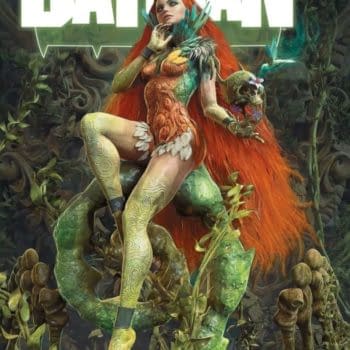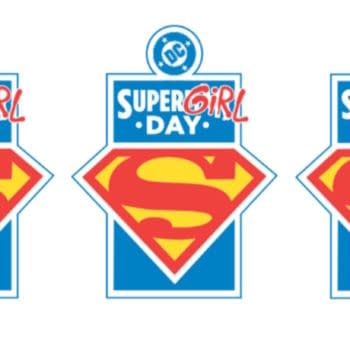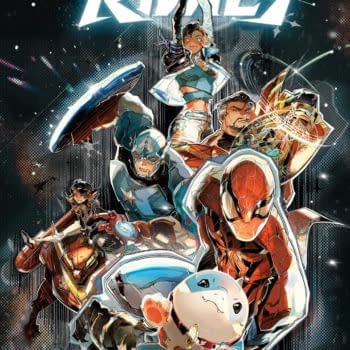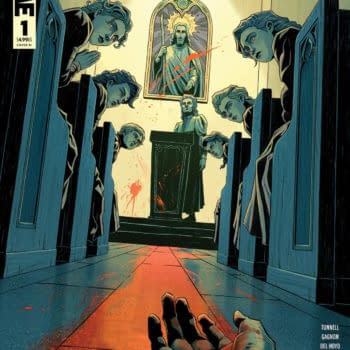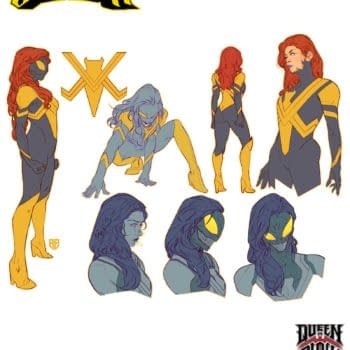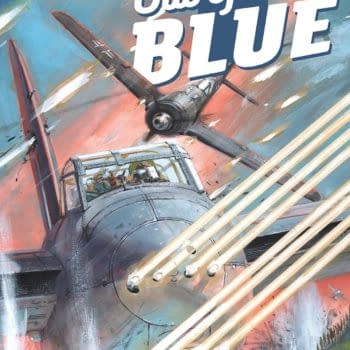Posted in: Comics | Tagged:
Pitching For Professionals At NYCC

It's not often you get a packed room on a panel before the general public arrives for a topic that involves no surprise storyline reveals or silly, audience participation swag. But you wouldn't know that from the crowd squeezed in to hear the Pitching For Professionals panel with Andy Schmidt (former Marvel/IDW Editor), Nick Lowe (Marvel Editor), Paul Allor (Comics Writer), and Bob Schreck (Legendary Editor).
Schmidt led the audience through a slideshow entailing sensible (yet oft ignored) advice on nearly every stage of pitching, starting with how to get the opportunity to pitch. If the publisher's site says "No Unsolicited Material" (and many of them do) then get solicited. If the publisher's site says "No Unpublished Writers" (and many of them do) then get published. Getting solicited can be as easy as meeting an editor at a convention and just asking, "Can I send you some material?"
Schmidt went on to encourage the audience to "build your network", not just try to meet and know editors but to also get to know other people in the field, writers, artists etc. Sometimes it's not enough to just meet an editor and it can help a great deal if someone else can introduce you, "Because then you're coming with a certificate of goodness."
"Be nice to people, be professional, get as many contacts as you can and follow up with people" Schmidt went on, laying out his ideas in brief, smart statements.
Next the two types of pitches were discussed, being verbal (rarer) and written (common). Try to relax and use the convention as a networking tool rather than the place to shove your work at people was a key piece of advice. Also after meeting someone who you'd like to work with, be sure to note down what you talked about, since people typically meet about a thousand people every ten minutes at conventions, it'll help you out in the long run if you can bring up exactly what you talked about when you follow up after the show. It's also helpful to talk about something non-comics related, since, again, the thousands of people who approach professionals at shows are probably only going to be focused on comic talk, having a non-comic subject to chat about will help you stand out in the pro's mind.
Schmidt also encouraged attendees to "know your story", knowing how to tell your story rather than talking about your story. "If you can tell your story in an entertaining way there's a reasonable likelihood that when you write it as a comic book it will be entertaining." he continued. Telling your story to friends, so that you get used to telling it was a bit of advice that seems almost superfluous at least based on my experiences with every writer I've ever met at every party I've ever attended. But maybe some writers are tight lipped about their dream ideas? Also thank the listener for their time, whether it's an editor or a friend, whether they love it or hate it, be sure to thank them for their time.
For the written pitch Schmidt emphasized the importance of including your contact information, relating a story from his time at Marvel where he was all set to green light a pitch but couldn't find the contact info of the author on any of the sheets. "Be very brief, no more than a single page for your entire story" Schmidt continued. He also emphasized important concepts like brevity and clarity. Character bios are a good way for the editor to get invested in the players who make up your story offered Schmidt. Keep your marketing advice to yourself was a point agreed upon by all editors on the panel. Make your written pitch inviting to read, Schmidt said before citing C.S. Lewis & Isaac Asimov as personal favorites for their simple, easy to read styles. Do I need to tell you that he thinks you should spell and grammar check your pitch? I feel that if you're not doing that, you probably aren't going to get anything published. Then again, that doesn't stop a lot of confused, angry people from screaming at the heavens about how the universe is so unfair to them, yet they won't take a second to look at themselves and what they're actually doing. Whoops! Got a little off track there. Sorry, during Presidential Election Season it's hard to keep the bile down. Along the same lines of the "so obvious does it need to be said" Schmidt reminded the assembled throng to "Only include professional looking art".
What's really sad about the obvious bits of advice (amidst a sea of really good advice, don't get me wrong) is that the people who need to hear it, never will. I realized this after my first San Diego Comic Con in 2010. In preparation for the event I picked up the handy [INSERT LINK] Survival Guide to the San Diego Comic Con. I read it cover to cover I was so excited. It repeated a lot of good, key advice I'd read elsewhere, especially on panel etiquette. It said to not use a Q&A to gush at an artist (we're all fans here obviously) or to ask them to sign something (that's what signing times are for) or to pitch your own work (no one wants to hear it), yet nearly every panel I attended multiple people committed these and worse sins. That's when I realized that I wasn't the person who needed to be reading all that advice on how to behave, I know how to behave, I'm not a thick headed asshole.
As for what art to submit, one splash page is enough, along with one or two character designs and a handful of story pages of sequential art. Check out the company's policies as they shift from place to place.
Schmidt himself began to Q&A by asking both Schreck and Lowe what they looked for in a pitch. Schreck replied with brevity, hearing the writer's voice, relating a story involving Concrete creator Paul Chadwick, insisting that if you've read his comics, you've essentially met him, so much of his actual voice is in that character. "Mike Mignola calls him HAL" Schreck said. "Keep the plot as lean as you can and most importantly if you end your pitch with, 'And it goes on from there', it doesn't."
Nick Lowe also insisted that being able to hear the writer's voice was key, going on to cite Joss Whedon as an example of someone who's scripts allow you to hear his voice "in every little bit" ("even the panel descriptions are entertaining"). Lowe also emphatically declared his desire to "feel something", making the pitch relatable and staying away from powers and inventions, focusing on the human side.
Paul Allor offered advice from the other side of the desk, having been in the pitching seat. He told the group to make people care and to focus more on the journey of the characters rather than plot mechanics. He also spoke in favor of for hire work, relating his own experience writing a Ninja Turtles book where his pitch did not fit into the continuity of the moment, but the editors liked the emotional journey he had the characters going on, so he was able to rework his pitch and get published.
I had the first question from the audience and asked the editors if they had ever passed on a book that went on to become successful somewhere else, citing Vertigo's passing on Chew. Schreck leaned into the mic and replied, "Concrete." He went on to tell of being at COMICO in the 80s and despite liking the pitch for reasons he didn't want to get into, something on "the business side" that would've "put [them] through hell, and we didn't want to go through hell, so we passed on it." Concrete funnily enough ended up at Dark Horse where Schreck would eventually end up as well. Schmidt shared a memory from his time at Marvel, involving an Invaders pitch that he liked that was also well received from others at the company, yet didn't fit in with where the line was going. Schmidt went on say that part of the reason he wanted to move forward with the project was because of an Invaders project that "imploded" and he "wanted to redeem [him]self".
A smart, fun panel with enough real world advice and personal insight to both inspire, warm and delight, the Pitching for Professionals panel was well worth the time. The audience left feeling more ready and more enthusiastic about moving forward down the treacherous and confusing path to professional comics.






